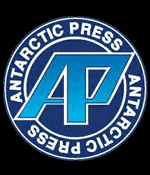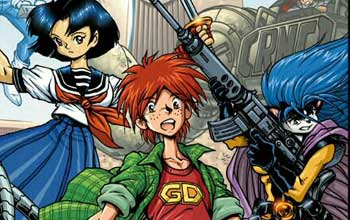by Luis Reyes and Tim Law
Ben Dunn is one of the most well known names in America's independent comic book industry. Infamous for his manga-styled artwork, Akadot caught up with Dunn at the 2001 San Diego Comic-Con where we talked about comics of all things. Ok, there was a bit of anime in there, too. Can you tell us about the genesis of Antarctic Press? Ben Dunn: Ben Dunn: Oh, gosh. Let's see. Back in 1985, I was in college. I did debut the book of Ninja High Schoolin '86 at Bay-Con that year. I did a preview book, so I guess the official debut was '86. The book didn't actually come out 'til '87. I started Antarctic Press basically because I was sick of college. Wanted to get into business for myself. Did you finish college? BD: Nope. I took four or five years of it, but never finished it. For some reason I just kept sticking around until I decided it just wasn't for me. Who picked up Ninja High School then? BD: I self published it initially at Antarctic Press. Then I got a call from Scott Rosenberg at Malibu Comics and Eternity Comics. They were picking up black and white titles at the time they wanted a big stash of books. Ninja High School was one of the titles they wanted to pick up, so I signed on with them and I did the book for them from 1989 'til about 1996, '97. And then you brought it back to Antarctic Press? BD: Right. When they sold the company to Marvel, they gave me back the rights to the book. In the meantime, what was Antarctic Press's big title? BD: A lot of Ninja High School spin-off's were our big titles. Ninja High School was being published by Eternity, but they allowed you to do spin-off titles? BD: Yeah. They didn't have a problem with that. Then we started getting into adult manga and manga in general and then doujinshi, and that became big, and then Warrior Nun came along and that became big, and then Gold Digger started becoming really popular, and now Gold Digger is our best selling book. Or at least our best selling comic. Our "How to Draw" series actually sells better.
Where did the name Antarctic Press come from? BD: Well, originally we were going to call it "Penguin Press," but there was already a company out there called Penguin Press, so we figured the next best thing to do was to call it the "Antarctic Press." We gotta call it something. It might as well be Antarctic Press, being as that it started with "A" and the catalogues for the distributors are listed alphabetically, we figured that was pretty important. Why were you going to call it "Penguin Press?" BD: We like Penguins. How is the independent comic market doing? BD: I think it's doing alright. I mean, it's surviving. The last "peak" it hit was back in '85, '86 or so, before the black and white bust. But I don't think it's ever hit a peak. What I think it's done is settled down comfortably to where it is right now. Did you guys ever publish black and white? BD: Well, we've always published black and white. It's actually only recently that we've done color. We were one of the first companies to pioneer the use of computer coloring. As far as computer coloring, what was the response in the fan community? BD: Well, it's just like anything else, they don't really think much about it. The only thing is that computer coloring tends to make all books look the same, because they're using the same programs, using the same techniques. It's just like anything else, you have some really good coloring, you have some really bad coloring. It's really just a matter of knowing what colorist to pick. It's just like any other palette, but, you gotta know what you're doing. Drawing comics, and being trained in a black and white vein, how did you find yourself changing your work to fit a color format? BD: Well, you don't have to do "Zip-a-Tone" anymore. You don't have to do as much detail, which is I guess a good thing or a bad thing, depending on how you look at it. I actually got pretty lazy because computers allowed me to do things that I normally couldn't do. But I've recently gotten back to doing just pure drawing again, not worrying about how it's going to be colored. |
||||||||


